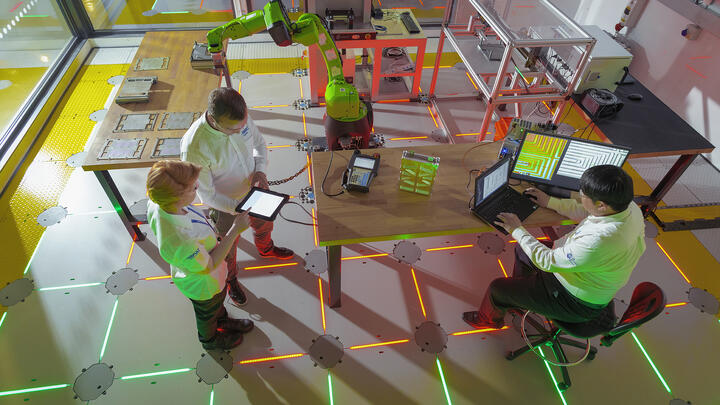Assurance in manufacturing
How does it link to the digital thread concept?
Assurance is a vital part of the digital thread, along with traceability, wider transparency and adaptability. The Hydrogen Electric Propulsion Systems (HEPS) testbed offers a linear manufacturing solution for hydrogen fuel cells from start to finish – connecting different steps to enable process optimisation, connectivity and assurance throughout the process.
The digital thread uses the same core ideas of this project to help manufacture high-value, high-complexity products using a ‘single source of truth’ model. The concept of digital thread can not only be applied to elevate linear assembly processes, but also seamlessly weave in different strands of assembly processes and component manufacture to create a cohesive, complex assembly.
The challenge
To develop a manufacturing assembly system and in-process inspection techniques to help optimise the process via data capture, evaluation and feedback; highlighting importance of assurance throughout the process with focus on connectivity and decision-making.
Background
The Hydrogen Electric Propulsion Systems (HEPS) project is a fuel cell assembly testbed based at the University of Sheffield Advanced Manufacturing Research Centre (AMRC) Cymru in North Wales. The project aims to de-risk the assembly and production scale up of hydrogen fuel cells for the automotive, aerospace and rail industries using Industry 4.0 technologies.
As part of the HEPS project, the team at AMRC Cymru has developed a smart workbench application which incorporates a timed app and a Power BI evaluation tool incorporated on the work, to support and optimise the assembly of hydrogen fuel cells
The HEPS testbed also consists of a reconfigurable floor, collaborative robots and other advanced Industry 4.0 technologies in a self-contained assembly area – with a focus on managing future production lines of the fuel cell.
With the fuel cell plates providing a concept of scale, the testbed and the individual applications of the project are designed in such a way that the set up can be easily reconfigured, customised and used to work on different parts or products (using a digital twin) across industries.
Innovation
Experts at AMRC Cymru developed a smart workbench that gives easy, augmented reality assisted work instructions, rather than just paper instructions. The smart workbench provides visuals (images and videos) of the work process on a component - helping an operator complete the process with added ease.
The smart workbench is connected to the data cloud and is integrated with the timed app, created using a dynamic 3D simulation model. The timed app was developed to monitor the assembly process in detail by measuring how much time is taking to complete each step of the assembly process. For instance, if a process is taking longer than expected to complete due to some issues, the timed app points out which step in the process is taking more time and helps analyse the bottlenecks in the assembly process.
The Power BI dashboard supports visualisation of the data that was captured via the timed app to show what’s happening and give a detailed analysis. The tool identifies and visualises the bottlenecks in the process using the feedback from the timed app. It compares the historic performances for understanding which was the better operating time or better operating scenario and eventually helps develop/ provide recommendations on how the current process can be improved.
Result
In the case of fuel cell assembly, all cells are manually assembled but the AMRC has learned that an estimated 60 to 70 per cent are reworked and put back together again, increasing the chances for an error. With the easy instructions provided by the smart workbench, the chances of error can be reduced.
Together, the smart workbench and its connectivity system allow data to be captured via the timed app, and sent to the cloud for processing using Power BI to help with process control, monitoring and decision-making. The project provides tools and enables operators to make decisions based on complex criteria and requirements, ensuring a smooth flow of process.
Impact
Assurance is all-encompassing, cross-sector capability around data, traceability and verification of the product. Replacing the traditional idea of it being an end-of-line process, the HEPS testbed showcases the benefits of assurance throughout the process, such as -
producing less scrap and requiring less rework – helping reduce energy usage and making it more sustainable and efficient;
allowing feedback into design specifications and wider processes that can be controlled, and implementing efficient, real-time decision making for the manufacturing process;
collecting practical data that can be used in different areas of business to monitor, validate and improve processes, while highlighting connectivity.


